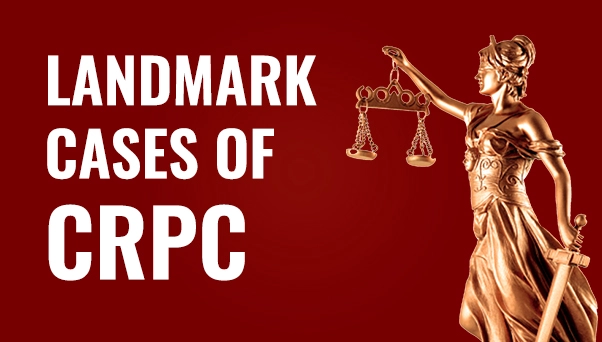The following are the list of Landmark cases for Code of Criminal Procedure –
1. Maneka Gandhi v. Union of India (1978)
This pivotal case contributed significantly to broadening the understanding of Article 21 of the Indian Constitution. This constitutional article commits to securing citizens their essential right to life and individual freedom. The verdict underscored the necessity for abiding by fair practices, regardless of whether legally justifying restrictions on a person's liberties, establishing a firmer foundation for due process under Indian laws. This stressed the need for all administrative or lawful actions seeking to restrict an individual's liberty to adhere to a process that is rational, fair and devoid of prejudice.
2. Kartar Singh v. State of Punjab (1994)
This notable case established directives for the detention of people under Section 41 of the Code of Criminal Procedure, stressing the significance of the rights of the accused. The guidelines make clear that an individual can only be apprehended if compelling reasons exist, such as the prevention of further offense or influencing of witnesses. Police action must be judicious and carefully weigh public security concerns against protecting civil liberties
3. Zahira Habibullah Sheikh v. State of Gujarat (2004):
This particular case highlighted the need to guarantee a fair legal procedure and protect the rights of those victimized and bearing witness, during court trials drawing significant public attention. It underscored the vital need for all involved to receive equitable and respectful treatment under the law, regardless of public attention surrounding the case.
4. Amitabh Bagchi v. Ena Bagchi (2005):
This was a landmark case that shed light about anticipatory bail, laid out in Section 438 of the Code of Criminal Procedure. The apex court instructed lower courts about the parameters they should consider when they must decide on granting or denying anticipatory bail pleas. Importantly, the judgment stressed that anticipatory bail applications should not be dismissed simply based on the seriousness or nature of the accusations or charges implicated against an individual.
5. Arnesh Kumar v. State of Bihar (2014):
This case centred on the misuse of Section 498A under the Indian Penal Code. It also aimed to set guidelines that would help curb arbitrary detentions related to women's cruelty affairs. The courts noted that Section 498A, initially created to safeguard women, was being turned around and used dishonestly to instigate unmerited accusations during marital conflicts. In view of ensuring impartiality for both the complainants and the accused, the courts introduced protective measures. This included scrutinizing complaints and arresting individuals concerned and testing the legitimacy of accusations before executing legally enforceable actions.
6. Shatrughan Chauhan v. Union of India (2014):
This landmark case examined important concerns surrounding capital punishment and established protocols for carrying out the sentences of individuals condemned to death, specifically in regard to postponements of executions and evaluating a prisoner's psychological state. The ruling provided direction for legal procedures involving inmates on death row to help ensure fair and humane treatment throughout the process.
7. State of Madhya Pradesh v. Shyamsunder Trivedi (1995)
The case of State of Madhya Pradesh v. Shyamsunder Trivedi (1995) clarified the authority and limitations of law enforcement officials during investigations. It emphasized following proper legal processes and procedures. The ruling ensured police powers are exercised judiciously and citizen’s' rights are protected according to the law. This balance is important to maintain fairness and justice for all.
8. Lalita Kumari v. Government of Uttar Pradesh (2013)
The case made it mandatory for police to register First Information Rports (FIRs) and established guidelines for preliminary inquiries before recording reports. The Supreme Court ruled that all cognizable offenses must be registered and investigated immediately. This aims to ensure swift justice and prevent cover ups. However, preliminary checks are permitted to verify facts and avoid frivolous/false complaints clogging the system. But these must be time bound without undue delay to filing an official report.
9. D.K. Basu v. State of West Bengal (1997)
This pivotal ruling established protocols to avoid torment and mortality during confinement, highlighting the rights of individuals in police guardianship. The judgement stressed the significance of humane treatment and respect for basic human dignity for all people subject to arrest or detention by law enforcement. Protecting vulnerable groups from harm and upholding civil liberties was the main point of discussion of this case.
10. Sakiri Vasu v. State of U.P. (2008)
This case brought clarity around the rights of the accused during an investigation, especially concerning the documentation of statements according to Section 161 of the Criminal Procedure Code. The ruling specified the entitlement of suspects to fair treatment when furnishing details to authorities. By recording exchanges officially and completely, the decision ensured transparency for all parties involved.
These cases have considerably shaped the understanding and application of the Criminal Procedure Code in India. They ensure impartiality, justice, and safeguard individual liberties within the judicial architecture.
